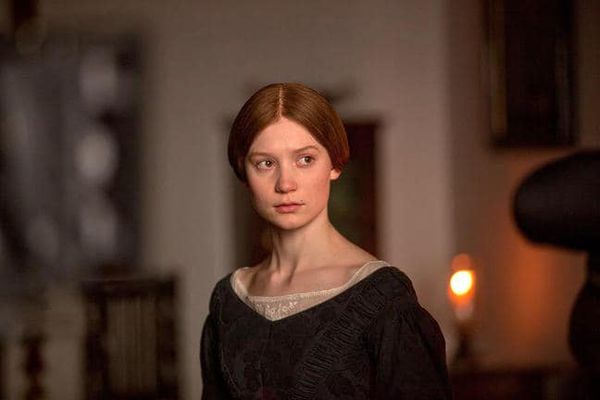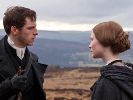Eye For Film >> Movies >> Jane Eyre (2011) Film Review
Jane Eyre
Reviewed by: David Graham

The latest attempt to adapt Charlotte Brontë's enduring classic of dawning feminist sensibility is a strong film in its own right even if it fails to do some aspects of the 1847 novel justice. Director Cary Fukunaga would seem a strange choice to direct, given that his debut Sin Nombre was a brutal and bleak political odyssey following South America's gang culture-dominated exodus towards the USA. However, that film's striking visual poetry and sense of gritty romance are echoed here through un-romanticized stone-and-candlelight interiors, dense rain-lashed locations, and the conflicted relationship between our heroine and her love interest.
Jane Eyre is an orphan who has struggled through all her life to be treated fairly for her merit and as an equal to men. Taking a position as a governess at the remote Thornfield Hall, she finds her young French charge amiable and the house's keeper Miss Fairfax a reassuring presence. The house's master Mr Rochester makes a less immediate friend for her; his sullen nature and impenetrable air conflict with Jane's direct manner. The pair soon bond, however, over their perception of the world, finding a kindred spirit in each other if not a romantic match. Rochester is courting the young Blanche Ingram, surely a better proposition than Jane could ever hope to be, but uncanny events at the Hall could bring the young governess closer to her master, or drive them forever apart.

Bronte's Gothic middle England has never looked better, even if Fukunaga strangely chooses not to shoot in full widescreen, as would surely befit cinematography this superb. This is one of the most visually ravishing period dramas ever, different in tone but definitely comparable to the lush painterly vistas of Kubrick's Barry Lyndon or Ridley Scott's The Duellists. The film's autumnal beauty and shadowy locations are the stark opposite of the dreamy springtime quality of Jane Campion's similarly themed Keats romance Bright Star; it's the most accurate representation yet of the novel's Gothic foreboding and overwrought Victorian melodrama. Indeed, it's hard not to ponder how the even more overblown Wuthering Heights might scrub up under Fukunaga's direction.
The novel established how strong Jane must have been by detailing her traumatic childhood - Fukunaga skips too briefly over this period, ladling on the misery but failing to establish how hard she must have worked to survive. These initial scenes are, however, some of the movie's most memorable, with Amelia Clarkson making a fiercely indomitable young Eyre as she spars with Sally Hawkins's haughty Mrs Reed. The novel's episodes in the 'red room' are sadly reduced to a solitary daytime scene; by ignoring the supernatural ambiguity of these moments Fukunaga squanders any real tension the central mystery may later have built. It's a real shame he doesn't make more of the night-time disturbances at Thornfield; one especially suspenseful sequence is every bit as spine-tingling as the set-pieces from Alejandro Amenabar's Henry James-inspired spookfest The Others.
The central performances are key to taking any adaptation of Jane Eyre seriously, and in this regard Fukunaga is blessed. The director's come under fire for casting such conventionally attractive actors to play characters who are purposely meant to be plain - it's especially easy to cast a sceptical frown on the swoon-worthy Michael Fassbender, whose roguish charm is only barely diminished by the written Rochester's downbeat sensibility - but there's no denying the leads attack the pseudo-Shakespearean script with gusto. Following on from her quietly impressive turn in The Kids Are All Right, Mia Wasikowska's nuance is evident throughout; impassioned moments see Jane's Northern accent and glottal stop slip out unchecked, while the tremble of her lip and burning behind her eyes speak volumes about the character's hidden reserve and righteous self-belief. She's still far from 'obscure' or 'plain', but she lights up the film with her intensely emotional turn, humble and gentle at some points, while at others spitting out her lines with a biting disdain.
Fassbender matches her in conveying Rochester's fraught, internalized desire; the actor makes it clear that there's more than a skeleton in his character's closet, and his frequent tete a tetes with Wasikowska evoke tangible romantic tension, even if their photogenic pairing makes their assertions of their own ugliness frankly ridiculous. They're backed up with sturdy support from Judi Dench as the kindly old house-keeper, and Jamie Bell (even more miscast than the leads) as Eyre's eventual benefactor. These secondary characters raise interesting questions of creed, religion, duty and social judgement, Fukunaga managing to touch on many of the book's themes while understandably remaining focused on the central romance. He may employ cliched sweeping camera movements to capture their first kiss, the leaves stirring and storm gathering predictably in the background, but he's also adept at handling the love story's more subtle, melancholy moments; the finely tuned climax in particular should leave viewers wiping away a bittersweet tear.
Die-hard Brontë fans may be dismayed by some of the corners Fukunaga has cut to get to the romance, but his narrative structure at least makes cinematic sense, throwing us in at Jane's lowest ebb to pique the uninitiated's interest in her present state before flashing back to her childhood to take the audience on even more of an emotional rollercoaster. His adaptation and casting are far from perfect - as usual, Fassbender's Irish brogue creeps in at inopportune moments - but the film gets the feel of the novel right, and that is surely more important than blind fidelity. You don't have to have read the novel to appreciate the film, and even those who'd normally find period drama coma-inducing should concede that this is a thoroughly well-made and invigorating piece of cinema. It's often easy to dismiss this sort of fare as Sunday afternoon TV fodder, but Jane Eyre really deserves to be experienced on the big screen.
Reviewed on: 09 Sep 2011

















